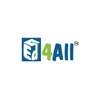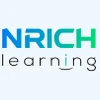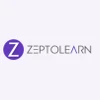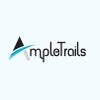Creating courses that are informative and interactive enough to keep your students engaged is a great way to expand your online presence. However, to create and publish good high-quality courses you need a robust Learning Management System or open source LMS.
Open source learning management system are generally free and can be tailored according to needs. Additionally, they are built on open standards, which make them interoperable with most ed-tech platforms. This makes open-source LMS a better choice than proprietary software in many cases
However, choosing open-source software is a challenging task because you have to depend on reviews and the support of the community.
In this blog post, we’ll look at 10 of the best open-source learning management tools available.
10 Best Open Source LMS Tools for Course Creation
| Tools | Best For | Pricing |
| Moodle | End-to-end course, class, and student management | Free |
| Odoo | Custom branding, assessment, and certification | Free |
| Thinkific | Creating, deploying and tracking interactive courses | ₹3113/month |
| Open edX | Enterprise grade deployment and learning management | Free |
| Canvas | Universal LMS for all types of teaching and Learning sessions | Free |
| ATutor | Providing interactive and resource based self-paced learning | Free |
| Forma | Corporates training and learning management | Free |
| Sakai | Collaborative learning and teaching experience | Free |
| ELMS | Next-gen Digital Learning Environment in the CMS Space | Free |
| Opigno | Drupal-Based LMS Software for Enterprises | Free Demo |
Here is the top open-source learning management software along with their features and pricing.
Moodle: Comprehensive Learning Management Software
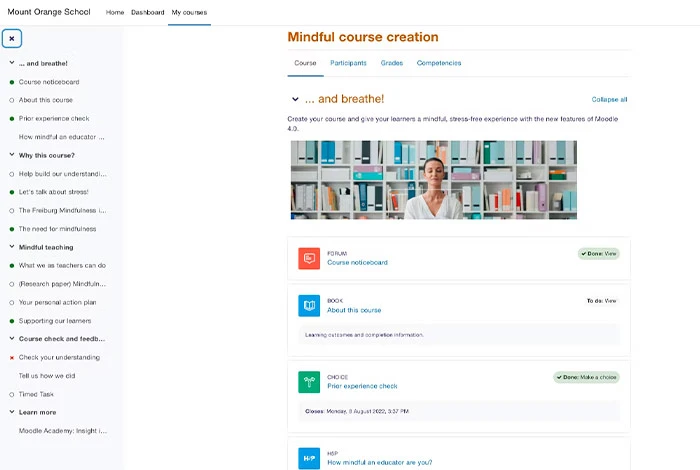
Moodle open source software integrates and streamlines the entire online teaching and learning process. From student enrollment and course creation to assignment submission and report distribution, Moodle allows you to track student progress and make changes instantly.
It has a simple interface with detailed documentation that could be set up and tailored quickly. Its robust features include video lectures, discussion forums, quizzes, and live chat.
Moodle Features
- Bulk Enrolment
- Cloud-based version
- Multi-Media Integration
- Group Management
- Self and peer Assessment
- Integrated Course Calendar
- Progress tracker
- Bulk Course creation and Backup
- Multilingual Interface
Moodle Pricing: Its completely free and open source learning management tool.
Odoo: Free Learning Management Platform for Course Creation and Management
Odoo allows coaching centres and institutes to build their own web portal and manage an entire e-learning system, including student attendance, registration, course creation and administration.
Tutors can import various e-learning courses from other providers and create custom courses from scratch. Moreover, online educators can track the progress of students, assess, and certify them with Odoo learning management tool.
Odoo Mobile Learning Platform Open Source Features
- Rapid drag and Drop Editing
- Multiple Languages Support
- Supports all type of media content
- Course Management
- Assignment Submission & Approval
- Student Attendance Tracking
- Quizzes & Test
- Integration with various Learning
- Assessment and Certification
Odoo Pricing: It’s a free (forever with unlimited users) and open-source learning management software.
Suggested Read: Best Online Learning Management Systems for Corporate Training
Thinkific: Online Course Building and Publishing Platform

Thinkific is a premium platform for creating, managing, distributing, and monetizing online courses. This is an integrated corporate learning management software that allows instructors to create courses, manage assignments and exams, and assign grades and rewards.
Educators can choose from more than 1,000 course templates from a range of topics, including marketing, sales, finance, and many others. Users can also integrate payment portals, stream live courses, and establish communication using Thinkific.
Thinkific provides analytics and performance reports that help you to improve your courses and gain better insights into your learners.
Thinkific Features
- Completely personalized branding with e-commerce
- Secured payment method integration
- Easy drag-and-drop course builder
- Multiple groups and communities
- Multiple communication channels like email and live chat
- Option to embed assignments and quizzes in course
- Drip scheduling to control pace of course
- Custom offers, discounts, and campaigns
Thinkific Pricing: It has a free plan with generic features like website templates, and 1 user admin account. However, the Basic plan cost ₹3113/month which allows custom domain, one-to-one student messaging and much more.
Open edX: Scales Your Teaching Platform to Enterprise Level
Open edX is a free and open-source software that allows faculty members and online campuses to build and publish all types of courses and content. You can record lectures, set quizzes, grade assignments, manage course participants, and create, share, and reuse educational materials too. It has a large community of users and an active GitHub development team.
Open edX Features
- Discussion boards and Interactive forums
- Live video sessions
- Cloud based and on -premises deployment
- Single/multi-tenant
- Advanced instructor and learning dashboard
- Real-time data analysis
- Supports 53+ languages
- Multi-user authoring capability
Open edX Pricing: It’s an open source and free LMS software
Canvas: Learning Management Solution for Everyone
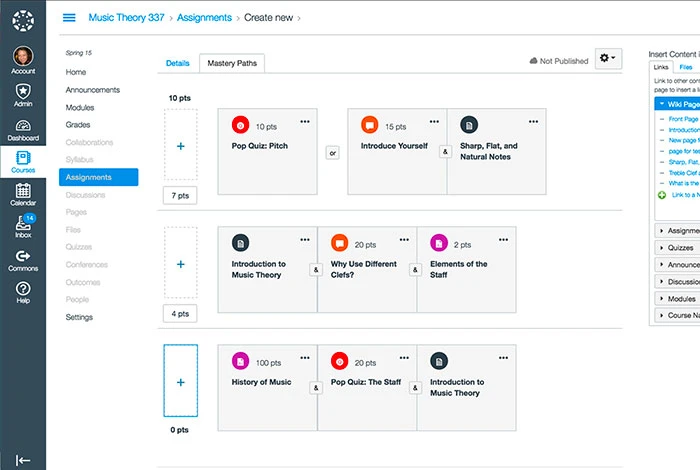
Canvas Studio is a cloud-based learning platform for educators and businesses. It provides a set of collaborative tools for creating engaging eLearning experiences. Canvas also provides a secure environment to engage in collaborative learning. The platform also offers rich-media learning environments for students, interactive assessment and adaptive learning tools.
With multiple products like Canvas Studio, Canvas Catalogue, Canvas Credentials, and Canvas studio, schools and educational institutions could manage everything from student tuition to corporate training.
Canvas Learning Management Platform Features
- Author Checklist
- MCQ, Checkbox, Numeric and open response assessment
- Self-service portal
- Batch enrolment
- Course progress bar
- Course certifications
- Push notification and alerts
- Course catalogue segmentation
Canvas Pricing: It’s a free learning management system.
Suggested Read: Compare Best Canva Alternatives for PC & Mobile: Free and Paid
ATutor: Interactive Self-Paced Learning Management Tool
ATutor is a customizable web-based teaching platform to create and deliver online classes. It includes a feature-rich interface that enables users to create courses, set up content, organize tests and send assignments, and monitor the progress of each student. It is easy to customize and use and it ensures smooth management of both the content and students.
ATutor offers a scalable architecture for delivering online education and knowledge management services. It helps organizations to easily build and manage their own e-learning courses with course creation, content management, discussion board, and e-portfolio modules.
ATutor Features
- Content learning object repository
- Accessibility and eligibility checker
- Growing community and support
- Multiple language support
- Polls, FAQs, and Forum section
- Course properties, enrolment manager and modules
- Web-based
- Multiple course delivery options
- Online and offline course management
- Self-paced and instructor-paced modes
- Integration with third-party applications
- Customizable interface
ATutor Pricing: Completely Free
Suggested Read: How Can LMS Software Promote Hybrid Learning in Schools
Forma: For Training and Upskilling Employees of an Organization
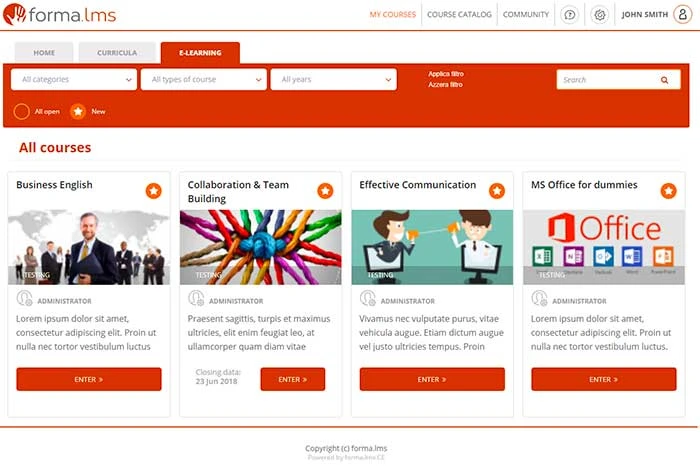
Forma.lms learning management tool is an e-learning system designed specifically for business. It can be used to build courses, lessons sessions for employees training and upskilling. Forma supports the creation of training levels like assessment, development, delivery and evaluation, with multiple assessment tests.
Companies can also schedule, grade, notify, and generate custom reports along with user management, email communication, and learner management.
Forma LMS Features
- Self-Paced learning
- Custom branding
- Responsive layout
- Automated assessment, grading and certification
- Integrated e-Commerce and multi-client management
- Interactive lessons and assessments
- Community managers
- Video recording and playback
Forma Pricing: Forma has a free plan with limited features.
Sakai: Powerful Learning and Teaching Experience
Sakai LMS creates a seamless teaching experience for teachers and students. Faculties could easily create learner-interactive courses by embedding, quizzes, polls, test assessments, and attaching resources.
Sakai also has functionalities such as instructor and student collaboration, blogs, wikis, assessments, live chats, analytics, and a roster. It also offers powerful third-party integration with cloud storage, libraries, and social media for a consolidated teaching experience.
Sakai Learning Management Platform Features
- Assessment and grading
- Announcements, Notification, and automated emailing
- Supports podcasts, webinars, and news release
- Course calendar and syllabus tracking
- Powerful administrative setting for total control
- API and Integration with major platforms
- Attendance, Certification, and evaluation system.
- Large community and tech support
Sakai Pricing: Free and open source.
Suggested Read: Importance of LMS for College & University Management
ELMS
ELMS is an open source digital learning environment (NGDLE) that helps formulate innovative course technologies. It is like Google Apps for colleges or institutions that helps run and control a course and deliver effective methods of teaching complex topics. Furthermore, unlike other open source LMS tools that are built on pure LMS, ELMS is built on Content Management System (CMS) space.
ELMS Learning Management Platform Features
- Utilizes industry standards like LTI, REST
- Massive development community & tech support
ELMS Pricing: Open source LMS software
Opigno
Opigno is one of the best learning management systems for enterprises. It helps create effective learning solutions for your organizations and helps your employees adopt new skills.
This Drupal based LMS tool has user-friendly features that can be customized as per your training needs. The training content is automatically aligned to learners based on their profiles, roles and results.
Opigno Learning Management Platform Features
- Open source & Drupal based
- Innovative & collaborative learning solutions
- Business oriented approach
- Customizable e-learning platform
- Full support from team of experts
- Innovative solutions at fair price
Opigno Pricing: Demo can be requested from the official website
Things to Consider While Choosing an Open Source Learning Management System
Here are the few things that you should consider while selecting an Open Source Learning Management Software for your institution or company.
- Documentation: Always look for tool with significant documentation to guide you through the learning process.
- User Interface: A platform with an easy-to-use interface is more comfortable to operate. The less time you spend trying to understand the system, the more time you get to develop the courses.
- Security: The platform you select should have robust security features to protect your data. It should also allow only authorised users to access the system.
- Community Base: A large and active community is an excellent sign that the system is continually being developed and improved.
- Deployment: The system should offer different methods of deployment to ensure that it meets your needs. Self-hosted and cloud deployment are the most preferred in case of Deployment.
What are the Consequences of Not Having an LMS Platform
Here are a few challenges you might face without an LMS:
- High chances of training courses being duplicated
Without an effective LMS, you could never be aware of all the training resources of your organization. This may lead to duplication of program in the learning portal of your organization.
- Lack of tracking and reporting
Tracking the performance of any learning material is certainly the most challenging task to do manually. With LMS, you can leverage data and analytics for valuable insights like the number of learners who have enrolled for a specific course or your most accessed courses.
- Difficulty in tracking employee progress and performance
Lack of appropriate tools makes it impossible to accurately measure employee training results. However, with improved reporting capabilities of LMS tools, you can measure employee performance accurately as well as derive valuable data for the future.
Best Open Source LMS Tool: Editor’s Choice
These were some of the best Open Source LMS based on popularity, features and user reviews. Although every learning management tool has their own area of specialization, Canvas and Moodle are comprehensive learning management suites that offer a range of features and benefits. If you need an all-in-one course development and publishing tool, Moodle and Canvas are great choices.
FAQs
What is the best open source LMS?
The best learning management platform depends on the specific needs of your organization. However, some of the most popular tools include Moodle, Sakai, and Blackboard.
What does open source LMS mean?
Open source LMS refers to a learning management software that could be download on your own system, self -hosted and modified to meet the specific needs of your organization.
What is the difference between an open source LMS and a proprietary LMS?
The source code of an open source LMS can be modified, and the entire software could be self-hosted while a proprietary tool is owned by a single company and the source code is not allowed to be customized.
What are the benefits of open source LMS tools?
Some of the benefits of open-source learning management tools include the ability to customize the platform to meet your specific needs, the ability to self-host the platform, and the ability to access a large community of users for support.
Is Canva LMS open source?
Yes, Canva is a modern, open source LMS system under the AGPLv3 license. It is used by K-20 institutions all over the world.
Is Moodle LMS free and open source?
Yes, Moodle is an open source platform that is licensed in a way that makes any learner download the entire software absolutely free of cost. Learners can even customize its operation. (Templates & custom designs available)
Related Categories: Learning Management (LMS) Software | Educational Software | Student Information System | Student Management Software
Rajan is pursuing CA with a keen interest in trends and technologies for taxation, payroll compliances, Tally Accounting, and financial nuances. He is an expert in FinTech solutions and loves writing about the vast scope of this field and how it can transform the way individuals and businesses... Read more



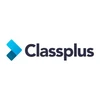
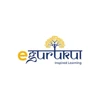






.png?d=100x100)

